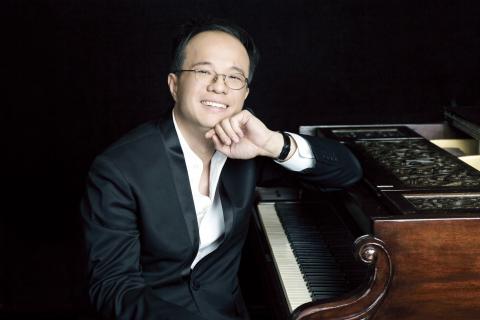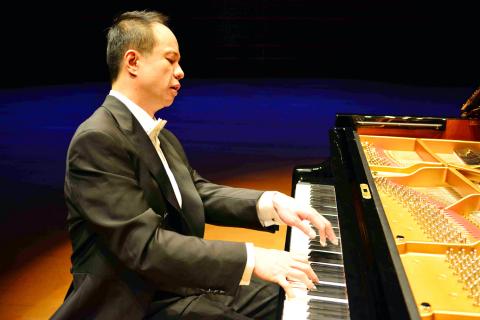Chen Ruei-bin (陳瑞斌) doesn’t get stage fright, but as the concert pianist enters the 3,000-seat performance space in Los Angeles he’s shaking with anxiety. He sits at the piano, straightens himself, pauses and begins to play.
A magnitude 6.4 earthquake had just hit southern Taiwan, devastating much of his home neighborhood of Yongkang District (永康).
“I was in the air when it happened,” he recalls. “I only found out after landing in LA.”

Photo courtesy of Chen Ruei-bin
As he begins to play, he still has no word of his family’s whereabouts. Many in the audience were aware of the situation.
Chen’s ability to persevere under intense pressure is a reason why he is one of the world’s most sought after pianists.
After Chen finishes his final piece, the crowd erupts in a roar.

Photo courtesy of Chen Ruei-bin
“It was the most touching ovation I’d ever received,” he says.
SOUTHERN BOY
Born to music teachers, Chen grew up in a school staff dormitory: a little Japanese-style house built on short wooden stilts with cats chasing mice under floorboards.
Chen spent much of his childhood at the family piano — a third-hand ivory-keyed 140-year old relic bought from a doctor.
Chen was destined for the stage. After making his debut with the Taipei Symphony Orchestra at age 10, he was sent to Austria to study at the Vienna Conservatory at 13, leaving his family behind in Tainan.
Unable to speak German, he says he barely left the comfort of his piano chair for those first months.
RUSSIAN MASTER
Chen was trained by Lazar Berman, one of the greats of the Russian romantic tradition, who only took on a handful of students, Chen being the only non-European among them. As a former KGB officer, Berman was barred from performing in the West for much of the Cold War.
“He was incredibly strict,” Chen says. “If you didn’t play exactly as he told you to, he’d just get up, walk away and stop teaching you. You had to learn to endure his wrath.”
Chen says Berman calls this the “Russian soul,” a tragic musical outlook that accepts no compromise.
Having lived through World War II and the Cold War, Chen believes it was the brutality and hardship his teacher had experienced that connected him on such a deep emotional level to music.
“Understanding his story and how he related his life to music was the greatest thing I learned from him,” he says.
It takes 20 or 30 years of playing pieces from masters such as Sergei Rachmaninoff and Alexander Scriabin to fully comprehend the meaning of their work. Chen says this immense undertaking is compounded by other factors such as historical context, the composer’s personal life and its cultural and philosophical milieu.
“I can feel the weight of history on my shoulders as I play,” Chen says.
MUSICAL HEALING
To honor the victims of the earthquake, Chen performed Scriabin’s Nocturn for the Left Hand in April of last year. Thankfully, he didn’t have to play at his parents funeral because they survived the earthquake.
“Scriabin suffered from depression,” Chen says, “You can feel his sorrow in his music.”
Scriabin’s music resonates with those who are in the depths of despair, he says, because it encourages them to keep going.
“Music amplifies people’s emotions,” he chuckles, adding that it has to have a greater purpose.
Active in numerous charities, he offers free tickets for families with disabled children to his concerts.
“Whether it’s making music or doing volunteer work, I want to leave behind as much as I can for this world.”

April 28 to May 4 During the Japanese colonial era, a city’s “first” high school typically served Japanese students, while Taiwanese attended the “second” high school. Only in Taichung was this reversed. That’s because when Taichung First High School opened its doors on May 1, 1915 to serve Taiwanese students who were previously barred from secondary education, it was the only high school in town. Former principal Hideo Azukisawa threatened to quit when the government in 1922 attempted to transfer the “first” designation to a new local high school for Japanese students, leading to this unusual situation. Prior to the Taichung First

The Ministry of Education last month proposed a nationwide ban on mobile devices in schools, aiming to curb concerns over student phone addiction. Under the revised regulation, which will take effect in August, teachers and schools will be required to collect mobile devices — including phones, laptops and wearables devices — for safekeeping during school hours, unless they are being used for educational purposes. For Chang Fong-ching (張鳳琴), the ban will have a positive impact. “It’s a good move,” says the professor in the department of

On April 17, Chinese Nationalist Party (KMT) Chairman Eric Chu (朱立倫) launched a bold campaign to revive and revitalize the KMT base by calling for an impromptu rally at the Taipei prosecutor’s offices to protest recent arrests of KMT recall campaigners over allegations of forgery and fraud involving signatures of dead voters. The protest had no time to apply for permits and was illegal, but that played into the sense of opposition grievance at alleged weaponization of the judiciary by the Democratic Progressive Party (DPP) to “annihilate” the opposition parties. Blamed for faltering recall campaigns and faced with a KMT chair

Article 2 of the Additional Articles of the Constitution of the Republic of China (中華民國憲法增修條文) stipulates that upon a vote of no confidence in the premier, the president can dissolve the legislature within 10 days. If the legislature is dissolved, a new legislative election must be held within 60 days, and the legislators’ terms will then be reckoned from that election. Two weeks ago Taipei Mayor Chiang Wan-an (蔣萬安) of the Chinese Nationalist Party (KMT) proposed that the legislature hold a vote of no confidence in the premier and dare the president to dissolve the legislature. The legislature is currently controlled